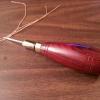-
Posts
11 -
Joined
-
Last visited
Profile Information
-
Gender
Male
-
Location
Illinois
-
Interests
Excellence in what I do and freedom from government to achieve it.
LW Info
-
Leatherwork Specialty
Wet forming, manufacturing, sewing machines, die cutting...I make leather bags, I make leather containers, done it all my life and can't help myself. Never had a job, made my living doing just this stuff.
Recent Profile Visitors
2,384 profile views
Dewey's Achievements

Member (2/4)
-
I doubt this will help most folks here but here's how I've been cutting leather lacing for ten lustrums . My needs are perhaps less exacting than are yours. I make very thin spiral cutting dies the length I need. I can make a die in about 30 minutes using automotive hose clamps, steel rule cutting blades (either 0.014" one point, or 0.028" two point, both 15/16" tall and center bevel.) See pictures. There is some material waste but I consider it acceptable due to the massive reduction in my labor. I don't need to edge the grain side because die cutting rolls the cut edge over by it's very nature enough to suit my needs. It's a great way for me to still utilize my scrap leather. In my youth I'd spend a lot of time in libraries and read that this is how the American Indians made their lacing. It ain't my idea, but I modernized it. You'd need a small but powerful press. Small hydraulic ones would be just fine. I stretch the lace to make it straight. The cutting die: The cutting press lace: I have made dies to make lacing that is much longer.
-
Has anyone ever seen one of these. I've had mine for 40 years, it was made in Leipzig Germany in 1879 and is original. I bought it from the scrap yard for $100 and it weighs probably 350-500 lbs. It quickly became my most valued piece of shop equipment and remains so today. I can find references on the internet to the company that made it but nothing on this. The head measures 9"X7". There has to be another like it out there somewhere.
-
Selling my Omac Model 978 thin leather skiver. I bought this 8 years ago or so, had it sent to a Texas company to be rebuilt and it's still on the pallet it was returned on. It's been stored in my warehouse ever since. I also bought a thick leather skiver at the same time and that's the one I currently use. Make an offer. Homer Illinois 61849
-

Removing Hook On 206 Rb5, Thread Fraying
Dewey replied to Sovran81's topic in Leather Sewing Machines
Sewing machines are very complicated instruments but easy to understand if one studies them. Besides all the obvious things to look for consider this please: On rotary hook machines there is a needle guard which prevents the needle from ever contacting the hook point. This needle guard is made from a malleable metal and is easily bent by the person setting up the machine. When setting up a machine, it's for a range of needle sizes and if you exceed that range it needs to be set up again to accommodate the change. Hook assemblies can be adjusted to the left or right. Starting with a NEW needle, the hook assembly is tapped into place until it just misses contacting the new needle then secured there. Re-time the machine and adjust the needle guard carefully in such a way to prevent needle/hook contact. Or you can do what I normally do which is to keep crocus cloth in my tool box and shine the burr off that pesky hook. Does nothing for the long term problem but keeps you working making stuff today. I frequently remove the hook and use a high speed fabric polishing wheel with tripoli compound to polish the hooks I work on. Hope this helped. -
I've been wet forming veg tanned leather for 50 years or so and have never seen anything like this before. Please don't laugh at my response, I'm serious. Were I required to do this, I'd start with veg tanned bull scrotums of varying sizes to attain the finished I needed, one fitting into the other. Then I'd make a male and a female matched aluminum mold which had minimal draft and the female could be separated into two pieces to remove the leather from it's form. It would take a proper press capable of developing several thousand pounds of pressure to accomplish the task. Relief holes in the female and male form would have to be engineered to help the excess compressed water to escape. The scrotums would necessarily be required to remain in the press and under pressure for some time (several hours depending). Then again there is the possibly more obvious solution which the Germans developed during WW2 to make synthetic leather from ground up powdered leather held together with a latex binder. They used this process they developed to cover books during the war. Today it's made in South America and it's called Recouro. I've used it extensively in some of the work I do. Many tons of it. Hope this helps. Personally I'd prefer the bull scrotum solution.
-

Where Can I Get Needles For A Durkopp Cl 17-1-1
Dewey commented on Mill Iron J's blog entry in Mill Iron J's Blog
May I suggest you try a system# 332. It's the same needle system used on the Adler 30-? and the Singer 29-K?. If it does not work, try raising or lowering the needle bar to accommodate that particular needle system and re-time the machine. Universal Sewing in St. Louis may be able to help supply you with the system# 332 needle in the size and point style of your choice.. -
I did. It's Homer, IL. Homer is a small town in Illinois about 18 miles East of Champaign Illinois. Homer's zip code is 61849. You are right, shipping could be a consideration. I had two of these machines and I sold one last year and think the shipping to Florida was in the $600 range.











